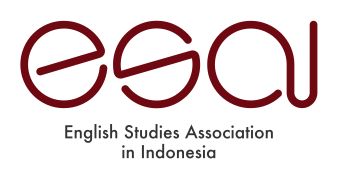Language Teacher Assessment Literacy: A Current Review
Abstract
Keywords
Full Text:
PDFReferences
Aditomo, A. (2019). Menghapus ujian nasional. Retrieved from https://ninoaditomo.blogspot.com, on 1 March, 2019.
Akmal, R. (2008). Analisis kualitas naskah ujian akhir semester mata kuliah bahasa Inggris II Politeknik Negeri Lampung tahun 2006. Jurnal Ilmiah ESAI Jurusan Ekonomi dan Bisnis Politeknik Negeri Lampung, Vol.2, No.1, hal.70-74.
Al-Malki, M. A. & Weir, K. (2014). A comparative analysis between the assessment criteria used to assess graduating teachers at Rustaq College (Oman) and Griffith University (Australia) during the teaching practicum. Australian Journal of Teacher Education, 39(12), 28-42.
Ashraf, H. & Zolfaghari, S. (2018). EFL teachers’ assessment literacy and their reflective teaching. International Journal of Instruction, Vol.11, No.1, pp. 425-436.
Brown, G. T. (2004). Teachers’ conceptions of assessment: Implications for policy and professional development. Assessment in Education: Principles, Policy & Practice, 11(3), 301-318.
Coombe, C., Troudi, S., & Al-Hamly, M. (2012). Foreign and second language teacher assessment literacy: issues, challenges, and recommendations. In O’Sullivan, B., Stoynoff, S. Davidson, P. & Coombe, C. (Eds.), The Cambridge Guide to Second Language Assessment. Cambridge: Cambridge University Press.
Coombe, C., & Davidson, P. (2019). Language assessment literacy in the Middle East and North Africa (MENA) region. Arab Journal of Applied Linguistics, Vol.4, No.2, 1-23.
Coombe, C., Vafadar, H., & Mohebbi, H. (2020). Language assessment literacy: what do we need to learn, unlearn, and relearn? Language Testing in Asia. 10:3.
Deluca, C., Lapointe-McEwan, D. & Luhanga, U. (2016). Approaches to classroom inventory: A new instrument to support teacher assessment literacy. Educational Assessment, 21:4, 248-266.
Djoub, Z. (2017). Assessment literacy: Beyond teacher practice. In R. Al-Mahrooqi, C. Coombe, F. Al-Maamari, & V. Thakur (Eds.), Revisiting EFL Assessment: Critical perspective (pp. 9–27).
Fulcher, G. (2012). Assessment literacy for the language classroom. Language Assessment Quarterly, 9(2), 113-132
Giraldo, F. (2018). Language assessment literacy: Implications for language teachers. Profile: Issues Teach. Prof. Dev., Vol. 20 No. 1, Jan-Jun.
Hakim, M.A.R. & Saputra, A. (2020). Efek washback ujian nasional subyek bahasa Inggris pada tingkat sekolah menengah pertama (SMP) di Indonesia. TADBIR: Jurnal Studi Manajemen Pendidikan Vol.4, No.1, Mei, hal.39-52.
Harmer, J. (2001). The practice of English language teaching. Essex: Pearson Education Limited.
Inbar-Lourie, O. (2013). Language assessment literacy. In Chapelle, C.A. (Ed.), The Encyclopedia of Applied Linguistics. Blackwell Publishing Ltd.
Janatifar, M. & Marandi, S.S. (2018). Iranian EFL teachers’ language assessment literacy (LAL) under an assessing lens. Applied Research on English Language, V.7 N.3, pp. 361-382.
Mellati, M., & Khademi, M. (2018). Exploring teachers’ assessment literacy: Impact on learners’ writing achievements and implications for teacher development. Australian Journal of Teacher Education, 43(6).
Mertler, C.A. (2003). Preservice versus inservice teachers' assessment literacy: Does classroom experience make a difference? Paper presented at the Annual Meeting of the Mid-Western Educational Research Association (Columbus, OH, October 15-18).
Mertler, C.A. & Campbell, C. (2005). Measuring teachers’ knowledge & application of classroom assessment concepts: Development of the assessment literacy inventory. Paper presented at the annual meeting of the American Educational Research Association, Montréal, Quebec, Canada, April 11–15.
Nurdiana. (2019). An analysis of written test instructions on language skills testing. A study presented at National Symposium on English Language Assessment: Assessment for Learning, Jakarta, 20 – 21 March.
Plake, B.S. & Impara, J.C. (1997). Teacher assessment literacy: What do teachers know about assessment? Handbook of Classroom Assessment. Academic Press, Inc.
Popham, W.J. (2004). All about accountability: Why assessment literacy is professional suicide. Educational Leadership, 62/1:82-83.
Popham, W.J. (2009). Assessment literacy for teachers: Faddish or fundamental? Theory Into Practice, 48(1), 4-11.
Pramawati, A.A.I.Y. & Wardana, I.K. (2016). Pendekatan penyusunan soal bagi guru-guru bahasa Inggris SMP sekecamatan Mengwi. Jurnal Bakti Saraswati Vol.05, No.01, hal. 49-59.
Puspawati, I. (2019). Understanding teachers’ knowledge, skills, and principles on language assessment: A survey on teachers’ language assessment literacy. Advances in Social Science, Education and Humanities Research, volume 353. Atlantis Press.
Schafer, W.D. (1993). Assessment literacy for teachers. Theory into Practice, 32(2), 118-126.
Stiggins, R. J. (1991). Assessment literacy. Phi Delta Kappan, 72(7), 534–39.
Stiggins, R. J. (1995). Assessment literacy for the 21st century. Phi Delta Kappan, 77(3), 238-245.
Stiggins, R. J. (2001). The unfulfilled promise of classroom assessment. Educational Measurement: Issues and Practice, 20(3), 5-15.
Stiggins, R.J. (2002). Assessment crisis: The absence of assessment for learning. Phi Dhelta Kappa, 83/10: 758-765.
Stiggins, R. (2007). Conquering the formative assessment frontier. In J. McMillan (Ed.), Formative Classroom Assessment. New York, NY: Columbia University Teachers College Press.
Sumaningsih. (2015). Kualitas butir soal UAS bahasa Inggris untuk siswa MTs di Samarinda. Lingual, Vol.12, No.2, September, hal.223-232.
Susuwele-Banda, W. J. (2005). Classroom assessment in Malawi: Teachers’ perceptions and practices in Mathematics. Unpublished Doctoral Dissertation, Virginia Polytechnic Institute and State University, Blacksburg, Virginia.
Tavakoli, H. (2012). A dictionary of research methodology and statistics in applied linguistics. Tehran: Rahnama Press.
Trisanti, N. (2018). Assessment literacy analysis on designing classroom language test. Advances in Social Science, Education and Humanities Research, volume 188. Atlantis Press.
Webb, N.L. (2002). Assessment literacy in a standards-based urban education setting. A paper presented at the American Educational Research Association Annual Meeting in New Orleans, Louisiana April 1-5.
Xu, Y. & Brown, G.T.L. (2017). University English teacher assessment literacy: A survey-test report from China. Papers in Language Testing and Assessment, Vol. 6, Issue 1.
Yamtim, V., & Wongwanich, S. (2014). A study of classroom assessment literacy of primary school teachers. Procedia - Social and Behavioral Sciences, 116, 2998–3004.
Zulaiha, S., Mulyono, H. & Ambarsari, L. (2020a). An investigation into EFL teachers’ assessment literacy: Indonesian teachers’ perceptions and classroom practice. European Journal of Contemporary Education, 9(1).
Zulaiha, S., & Mulyono, H. (2020b). Exploring junior high school EFL teachers’ training needs of assessment literacy. Cogent Education, 7: 1772943.
https://www.kompasiana.com/komentar/eddyroesdiono/551ffd15813311fa459df613/kualitas-buku-lks-dan-soal-ujian-bahasa-inggris-sd-bikin-sedih
DOI: http://dx.doi.org/10.30813/jelc.v11i1.2291
Refbacks
- There are currently no refbacks.



2.jpg)



